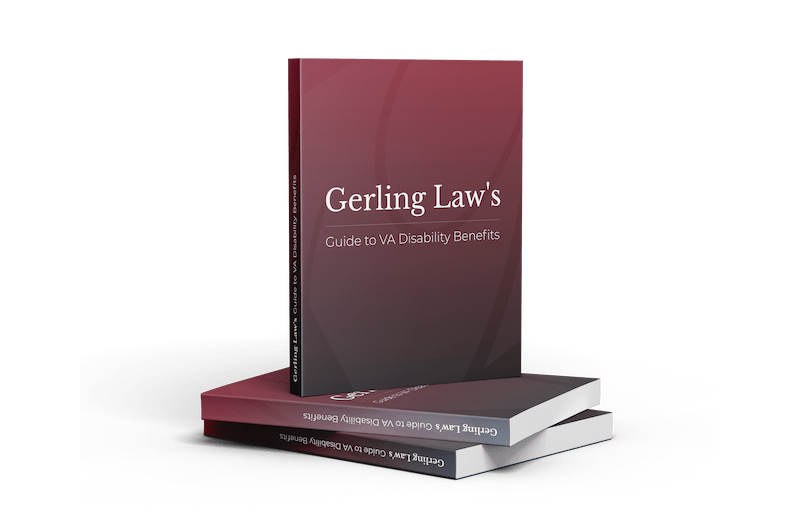
If you are a veteran who develops Parkinson’s disease, you might find yourself curious as to how Parkinson’s disease can affect VA disability benefits.
Generally speaking, VA benefits are a form of tax-free, monthly compensation that the VA pays to veterans who suffer from disabilities related to their military service.
To determine how much compensation an individual veteran gets, the VA gives them a disability rating. Additional disabilities, like Parkinson’s disease, can affect your disability rating.
Parkinson’s disease is one of the many disabilities recognized by the VA.
Regardless of whether you are already receiving VA disability benefits, as a veteran developing Parkinson’s, it helps to have some general knowledge about how Parkinson’s disease can affect those benefits.
Many veterans depend on disability benefits. For those veterans, it is absolutely crucial to understand what changes they can expect from the VA regarding Parkinson’s disease.
You may have questions like, Is Parkinson’s disease a 100% compensation disability? Or, What factors can impact my Parkinson’s disease disability rating?
If you have these kinds of questions about VA disability benefits and their interaction with Parkinson’s disease, don’t hesitate to give us a call at Gerling Law Injury Attorneys.
Our VA disability benefits team is always happy to answer your questions and set you in the right direction.
How the VA Grading System Works
Each application for VA disability benefits gets a rating. That rating then determines the total amount of benefits you will receive each month. The rating uses a percentage system. With a 100% disability rating, you will receive the maximum amount of compensation each month. Conversely, a 10% rating will net you much less.
You can always find current information on the VA’s rating system on their website. Before you do that, however, here are the basics. The VA determines your VA disability rating by using a points system. The points are awarded based on several factors, including age, length of service, and the severity of symptoms.
The VA then uses a special formula to assign you an individual disability rating and an overall disability rating. Together, these determine your combined disability rating, which dictates your monthly compensation.
What Is the VA Disability Rating for Parkinson’s Disease?
One of the questions we often field is, Is Parkinson’s disease a 100% compensation disability? The VA Parkinson’s disability rating can rise to 100%. However, it is not 100% by default.
Instead, the Parkinson’s VA disability rating has a minimum or default rating of 30%, but that is just the starting point. When you apply for VA Parkinson’s disability benefits, the VA looks at two numbers.
First, it looks at your individual disability rating using the aforementioned formula. Then, it compares that number to the default or overall disability rating for Parkinson’s disease, which is 30%. If your individual disability rating exceeds 30%, that is your disability rating.
In that way, your disability rating can reach 100%. Conversely, if your personal disability rating is, for example, 22%, you will instead receive a combined rating of 30%.
VA Disability: Parkinson’s-Like Symptoms
In 2021, the VA expanded its list of presumptive conditions associated with Agent Orange to include Parkinson’s-like symptoms as a form of atypical Parkinsonism.
Atypical Parkinsonism occurs when someone suffers from many of the same symptoms and harmful effects associated with Parkinson’s disease but does not respond well to typical Parkinson’s treatment.
In the VA’s eyes, that presented a problem. For the VA, Parkinson’s-like symptoms were so similar to Parkinson’s disease itself that differentiating and excluding affected service members from disability benefits would be unjust.
Contact a VA Disability Attorney for Help
Some General Notes on Parkinson’s Disease
Parkinson’s disease is a neurodegenerative disorder. That means that it adversely affects your brain.
Specifically, Parkinson’s disease impairs your brain’s ability to produce the neurotransmitter dopamine. Dopamine affects everything from movement and balance to concentration and mood.
Unfortunately, there is no cure for Parkinson’s disease at this time. Thus, it makes sense that Parkinson’s disease qualifies as a disability in the eyes of the federal government.
The Department of Veterans Affairs (VA), the Social Security Administration (SSA), and the U.S. Department of Labor (DOL) all consider Parkinson’s disease a covered disability under their respective programs.
Parkinson’s Disease: Symptoms and Treatment
There are quite a few different symptoms of Parkinson’s disease. Experienced alone, you might brush off some of the symptoms as minor inconveniences. When the effects start to combine, however, they can significantly impede your ability to live a normal life.
As the symptoms combine, the disease moves into different stages, causing increasing impairment. Some of Parkinson’s disease’s early symptoms include minor things like:
- Fatigue,
- Depression,
- Slurred speech,
- Changes in handwriting style, and
- Shakiness.
These are all early signs of Parkinson’s disease. The symptoms worsen over time, leaving many affected individuals unable to walk at a certain point. As you can see, these early signs are hard to spot unless they combine with one another.
If you feel like you might have Parkinson’s, it is critically important to seek a medical evaluation. After all, the VA will not approve your disability benefits application without an adequate medical diagnosis.
As noted, Parkinson’s disease is not a curable disorder. Still, there are ways to treat the symptoms of Parkinson’s and minimize its impact on your life.
Doctors often take a holistic approach to treating Parkinson’s disease symptoms. Treatment may include physical therapy, surgery, and prescription medications. More often than not, doctors use several different treatments to mitigate the impact of specific effects.
Parkinson’s Disease And Military Service
Over the years medical researchers have identified certain external factors connected to Parkinson’s disease. Researchers have demonstrated that people who were exposed to the factors are at a much higher risk of developing Parkinson’s than those who were not.
Many of the factors that medical researchers have connected to Parkinson’s disease are herbicidal chemicals used in agricultural settings. Researchers have identified several consumer-grade herbicides that increase the risk of Parkinson’s disease.
One of the notable herbicides that falls into this category is known as Agent Orange, which was used by the United States military during the Vietnam War.
Agent Orange was sprayed above forests and fields to kill vegetation so the military could identify enemy forces without the obstruction of the trees. Often, U.S. forces were exposed to the chemical along with enemy combatants.
Since the Vietnam War, researchers have identified several severe health problems, including certain types of cancer, associated with Agent Orange exposure. Some of these problems, including Parkinson’s disease, are what the VA refers to as “presumptive conditions.”
Applying for VA disability benefits for a presumptive condition is generally easier than applying for benefits for a non-presumptive condition. More on that below.
Veterans Can Get Disability Payments Through the VA
Typically, for the VA to approve your disability claim, you have to prove your disability’s specific connection with your military service. This is not the case, however, with presumptive conditions.
What Is a Presumptive Condition?
Presumptive conditions are medical conditions that the military acknowledges arise from a specific place and time in military service. Often they give this classification when a large group of service members is exposed to some sort of hazardous chemical during a specific conflict.
For example, for veterans of the first Gulf War, asthma is a presumptive condition due to the military’s use of burn pits in Iraq. Thus, a veteran of that war who develops asthma after their service has to demonstrate only that they served during that specific conflict to get VA disability benefits for asthma.
Parkinson’s Disease As a Presumptive Condition
In a 2009 report, scientists working for the federal government published research that connected Parkinson’s disease to Agent Orange.
As a result, in 2010, the VA added Parkinson’s disease to the presumptive condition list associated with the Vietnam War. The disease was also added to the list of presumptive conditions associated with two other places and times:
- Those serving in the Korean Demilitarized Zone between 1968 and 1971 and
- Those who stayed at Camp Lejeune for at least 30 days between August 1953 and 1987.
Thus, if you are suffering from Parkinson’s disease and fall into any of these categories, initially applying for VA disability benefits is a straightforward process.
What Impacts Parkinson’s Disease VA Disability Benefits?
There are several factors that can impact your disability benefits rate. Since there are too many potentially relevant factors, we will discuss some of the more common ones.
First, however, we need to look at the general requirements for VA disability benefits eligibility. If you don’t fulfill these requirements, the VA will deny your claim in all likelihood.
To meet eligibility requirements for VA disability benefits, you must establish the following:
- You must have served on active duty, active duty for training, or inactive duty for training; and
- Generally, you must have been discharged under other than dishonorable conditions. (But note that veterans receiving undesirable, bad conduct, and other types of dishonorable discharges may qualify depending on a determination made by VA).
Next, you need to show that your condition was related to your military service. You must submit the following:
- A current diagnosis of your condition by a certified medical professional;
- Documentation that you suffered an injury, an illness, or other debilitating event while in service; and
- Documentation demonstrating an identifiable link between the diagnosed condition and your military service.
Essentially, you have to prove that you served in the military, suffered from some illness or event, and subsequently developed a disability because of your military service.
Factors Outside of General Requirements
Outside of the general requirements to qualify for VA disability benefits in the first place, there are several factors the VA looks at.
These factors, taken as a whole, dictate the compensation rating you will receive. The benefits are distributed using a rate between 0% and 100% at 10% increments.
The VA uses a complex formula to make their determination. You can find the relevant factors published on their website. Still, here are some of the more notable factors that can increase your disability rating if applicable:
- If you are suffering from more than one disability at the same time;
- If your Parkinson’s disease worsens;
- The way and degree to which Parkinson’s is impeding your life and ability to work;
- Your age (the older you are, the higher the rate);
- Changes in Social Security benefits to counter inflation (the VA matches Social Security benefit increases);
- If you have children, a spouse, and other dependents;
- If your spouse or dependents have a disability; and
- If you lose a limb or the ability to use a bodily function (like walking).
All of those factors will impact your VA disability compensation rating. After your initial rating, you can periodically apply to increase your rating.
Similarly, there are some circumstances in which the VA can lower your rating. Typically, rate reductions don’t apply to Parkinson’s disease claims because Parkinson’s worsens over time. Still, it is something you should be aware of.
How to Win VA Disability Benefits with Parkinson’s Disease
While applying for the VA disability benefits for Parkinson’s disease is often a simple process, this is not always the case. Sometimes, even with presumptive conditions, the VA can seriously misjudge a disability’s impact on one’s life. If they underestimate your disability rating, you either have to accept the lower rating or go through an appeal process.
The appeal process is a daunting one, and one that you do not want to go into alone. If you have to appeal your disability rating, call a VA disability attorney for help as soon as possible. They will help you document your symptoms and negotiate on your behalf throughout the entire process.
Better than hiring a lawyer when you decide to appeal your disability rating is consulting with an attorney when you decide to file for VA disability benefits. By consulting with an experienced VA disability benefits lawyer first, you are more likely to avoid filing an appeal later on.
Contact the VA Disability Benefits Team at Gerling Law Injury Attorneys
Regardless of whether you currently have Parkinson’s disease, if you need help with VA disability benefits, Gerling Law Injury Attorneys has you covered. Since VA benefits are a question of federal law, it doesn’t matter where you live—we can help.
As a team dedicated specifically to VA disability benefits, we know the ins and outs of the claims process. It’s crucial to have experienced help on your side when it comes to these claims as VA benefits are a complex area of law.
An attorney without relevant experience may miss an important detail. Give us a call today for a free consultation, and let’s team up to get you the compensation you deserve.
You served our country, and we are here to serve you. Go with Experience. Go with Gerling. ®




